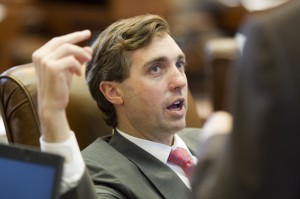After a lengthy and sometimes heated debate, the Texas Senate on Tuesday passed an “ethics reform” bill that had been watered down in committee and was then loaded up with amendments on the floor.
As announced by Lt. Gov. Dan Patrick from the dais, the vote on final passage of Senate Bill 19 by Sen. Van Taylor, R-Plano, was 30 to 1. The vote count after that was unanimous, however, according to a Senate aide. With a sense of irony, it was noted by some observers that the vote count on this “ethics” legislation was not immediately transparent.
Among other big changes, the Senate unanimously approved amendments by Sen. Kirk Watson, D-Austin, requiring disclosure of lobbyists paying for legislator meals of at least $50 – even if they split the check.
“The goal of the amendment is to support meaningful disclosure,” Watson said, noting that the language was similar to a bill that he’s not had any luck passing. “They (lobbyists) can still split the bill,” Watson said, but added that under his amendment a detailed report would still be required about what was spent.
Before the bill came to the Senate floor, it had been significantly weakened. For instance, a provision was cut that would have barred lawmakers from participating in the public debt business. That’s been a top priority of Gov. Greg Abbott, who originally proposed it. This proposal would not prevent lawmakers from doing public debt work, but they would have to disclose it.
The original bill also contained a “cooling off period” for lawmakers who wish to become lobbyists after their career in The Legislature has concluded. But, under the bill that came out of committee, that mandatory cooling off period would only apply to lawmakers going forward. Current lawmakers would be exempt.
One major point of contention was a “compromise” amendment offered by Sen. Joan Huffman, R-Houston, that would require lawmakers who are lawyers to disclose referral fees. Sen. Van Taylor opposed the amendment, arguing that lawmakers should be outright banned from collecting those referral fees. Taylor moved to table that amendment but he was shot down and only got 3 votes on his side. It is rare, if not unheard of, for the Senate author of a bill to move to table an amendment and then lose that vote.
Sen. Jose Rodriguez, D-El Paso, was successful in strengthening the bill on the floor in two key ways. On split votes, the Senate agreed with him that personal financial statements should include all forms of income, including pensions, and those financial statements should be placed online.
Those moves were opposed by Sen. Huffman and others who argued that it may be bad policy to put those requirements on lawmakers at this point in the process.
Huffman and Sen. Paul Bettencourt, R-Houston, said retirement income doesn’t affect any of their votes and therefore shouldn’t be required to be disclosed. Bettencourt said he’d rather see the amendment offered as a standalone bill in committee and come to the floor after it’s been vetted in that fashion.
Rodriguez countered that public disclosure of all income would wipe out even “the appearance of conflicts.” “I think we can be above board and say ‘this is where our income comes from,'” he said.
The Senate voted 17 to 13 to include all income on personal financial statements. The vote was 16 to 14 to place those statements on the internet.
Some Republican members, including Sen. Donna Campbell, R-New Braunfels, argued that putting those statements online could potentially put officeholders’ safety at risk. Sen. Robert Nichols, R-Jacksonville, went so far as to point to an example of someone he knew who was kidnapped and killed. He wondered aloud if lawmakers would be put at risk in the same way if their personal information was placed on the internet.
A failed amendment from Sen. Don Huffines, R-Dallas, would have barred lawmakers from hiring each other or entering into any kind of business deal. That prohibition would last for two years after a lawmaker left office.
Huffines, who could not point to a specific example of one lawmaker hiring another, got into a particularly nasty exchange with Sen. John Whitmire, D-Houston. Whitmire accused Huffines of pushing the amendment to “settle a political score” with former Sen. John Carona, R-Dallas, who Huffines narrowly defeated in the GOP primary last year.
Huffines’ amendment was rejected 25 to 6.
Sen. Carlos Uresti, D-San Antonio, attached an amendment to prevent a sitting legislator from being paid to sit on a board. Lawmakers and local officeholders would have to submit to drug testing under an amendment from Sen. Eddie Lucio, D-Brownsville. That proposal was adopted unanimously.
Some things were a bridge too far, however.
An amendment by Sen. Rodney Ellis, D-Houston, to require disclosure by lawmakers of their federal tax returns was soundly rejected.
The bill is far from becoming law.
The Texas House of Representatives is expected to make changes of its own before it could be sent to Gov. Greg Abbott for his signature. In an emailed statement, Abbott praised the bill’s passage. “I applaud the Texas Senate for passing a meaningful ethics reform package,” Abbott said. “SB 19 reinforces the faith and trust that Texans deserve to place in their government, and it ensures that we remain focused on who we truly serve – the people of Texas. I look forward to working with the House to enact these ethics reform into law.”
Note: The original version of this story appeared on The Quorum Report. Join us there for daily coverage of Texas politics and government. Copyright April 28, 2015, Harvey Kronberg, www.quorumreport.com, All rights are reserved. Reprinted with permission.


